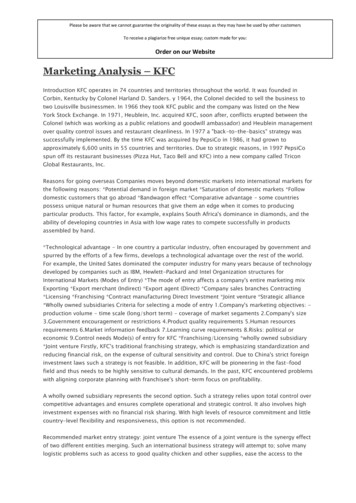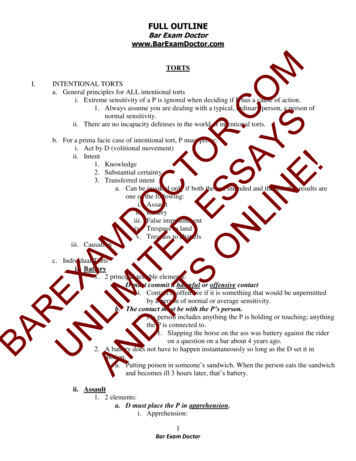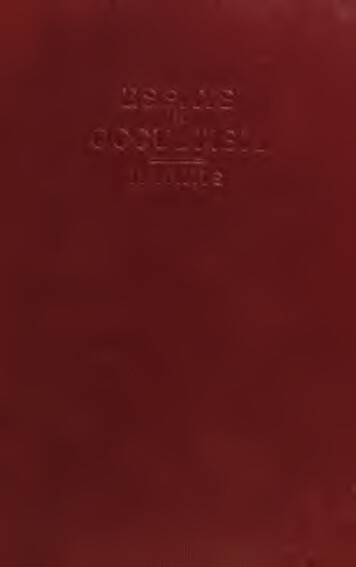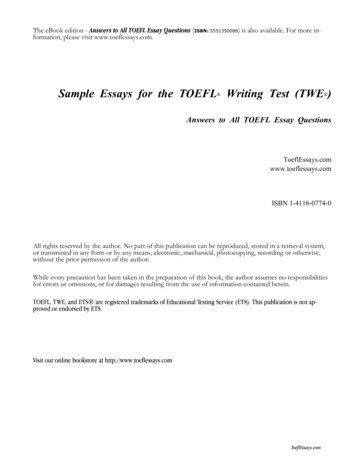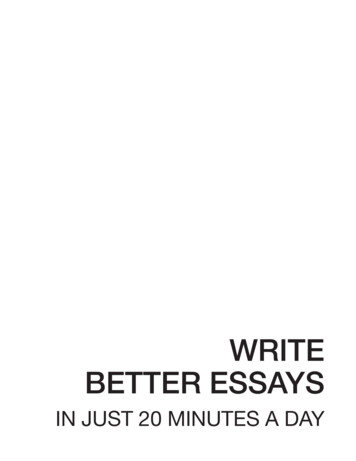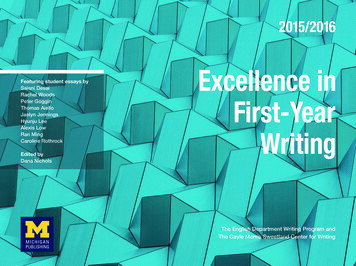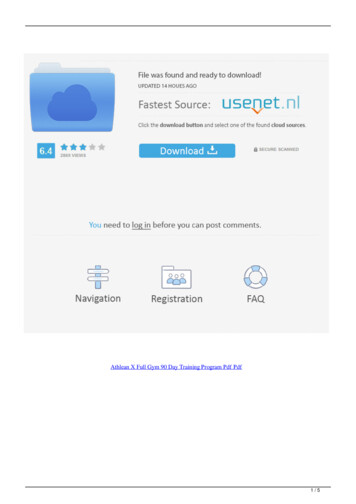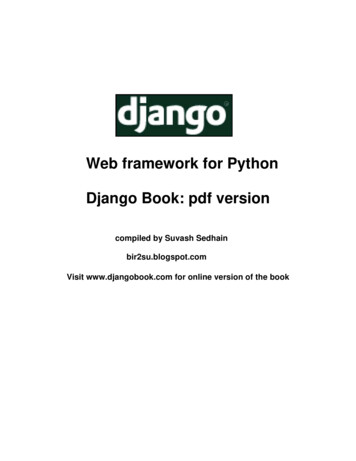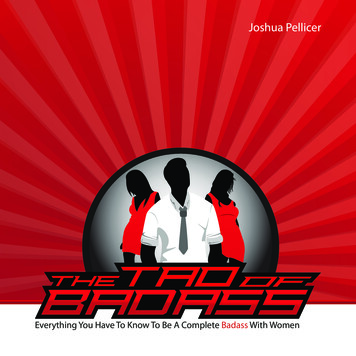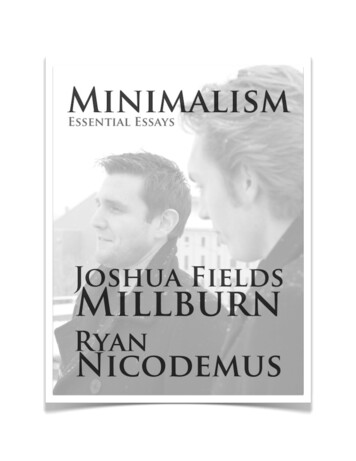
Transcription
MinimalismEssential EssaysJoshua Fields Millburnand Ryan Nicodemus
Also by The MinimalistsMinimalism: Live a Meaningful LifeAlso by Joshua Fields MillburnFalling While Sitting Down: StoriesAs a Decade Fades: A NovelMore InfoTheMinimalists.comJoshuaFieldsMillburn.com
Published in 2011 by Mins PublishingCopyright 2011 by Joshua Fields Millburn and Ryan NicodemusAll rights reserved, though it would be appreciated if youʼd tell other people about this book ifyou enjoy it, whether you paid for it or not. Let it be known that any profits from this book willmost likely be spent on coffee and/or burritos.Library of Congress Cataloging-in-Publication DataMinimalism: essential essays / Joshua Fields Millburn, Ryan Nicodemus. — 1st ed.ISBN-10: 1-936-53945-1 ISBN-13: 978-1-9365394-5-11. Title. 2. Minimalism. 3. The Minimalists. 4. Simplicity. 5. Self-improvement.Feel free to take pieces of these essays and replicate them online, but please give a link back towww.theminimalists.com along with it. If you want to use more than a few paragraphs, it wouldbe great if you’d email theminimalists@theminimalists.com and let us know what youʼre up to.Contact Information:Joshua Fields MillburnRyan Nicodemusemail: theminimalists@theminimalists.comweb: theminimalists.comCover photo by Mick Evans and Hillary HopkinsCover design by Colleen McCullaFormatting by Chris O’Byrne at ebook-editor.comSpecial thanks to four people who helped make this collection appreciably better with theirediting and proof-reading efforts: Will Peach, Lee Knowlton, Cynthia Schrage, and Miles Price.Also: a big thank you to our readers. We appreciate you. We write these words for you.
For —— and ——
ContentsPart One IntroductionAbout The Minimalists9Foreword10What Is Minimalism?11Part Two Living in the MomentBe On the Mountain15Clear Your Damn Plate18Part Three Emotional HealthOn Happiness21Letting Go of Sentimental Items24Jealousy Is a Wasted Emotion29Dealing with Overwhelm (Unpublished)32Motion Creates Emotion35Part Four GrowthGrowth Through Minimalism38Minimalism Scares the Shit Out of Me41Minimalism Is Healthy: How I Lost 70 Pounds4330 Is Not the New 205030 Life Lessons From 30 Years52Part Five ContributionGiving Is Living63Establishing Deeper Connections with People67Adding Value70Minimalist Family: Start with Yourself73
Part Six Passion & MissionI Quit My Six-Figure Job to Pursue My Passions77Stop Living the Lie; Start Living the Life81Screw You, I Quit!86Minimalist Finances and Budgeting92Part Seven Taking ActionHow To Make a Damn Decision101Never Leave the Scene of a Good Idea without Taking Action106Packing Party109Part Eight Change & ExperimentationStop Trying112Minimalist New Year Resolution114You Are Not Your Khakis116Why I Don’t Own a TV120Killing the Internet Is the Most Productive Thing I’ve Ever Done125Killing Time: Over Time I Got Rid of Time130Focus on What’s Important (Unpublished)133
Part One Introduction
About The MinimalistsHello. We’re Joshua Millburn and Ryan Nicodemus—The Minimalists. We’re two thirtyyear-old guys who write essays about living a more meaningful life with less stuff atwww.theminimalists.com. Our essays have been featured on dozens of popular websitesthroughout the Internet. Both of us have extensive experience leading large groups ofpeople in corporate America—coaching and developing hundreds of employees to growas individuals and live more meaningful lives. Read more about us here.Once upon a time, we were two happy young professionals from Dayton, Ohio.But we weren’t really happy. We were best friends in our late twenties, and we both hadgreat six-figure jobs, nice cars, big houses, plenty of toys, and an abundance of stuff ingeneral. And yet with all this stuff, we knew we were not satisfied with our lives. Weknew we were not happy. We discovered that working 70 to 80 hours per week andbuying stuff didn’t fill the void. So we took back control of our lives using the principlesof minimalism to focus on what’s important in life. Our website documents our journeyinto minimalism and our continued growth through experimentation.Thank you for reading this essay collection. We hope you enjoy it.9Joshua Millburn Ryan Nicodemus
ForewordWe started theminimalists.com in 2010 with two objectives in mind: to document ourjourney into minimalism and inspire others to take a similar journey, resulting in amore meaningful life for us and for others.This book is a collection of twenty-nine of our most important essays—someshort, some long—since the inception of our website. These essays are purposefullyorganized into seven interconnected themes (i.e., seven parts): living in the moment,emotional health, growth, contribution, passion and mission, taking action, andchange and experimentation. The order is deliberate—this collection is meant to be readfrom beginning to end. We believe doing so will result in a better overall experience—adifferent experience from reading the essays on our site—connecting various conceptsthat might not otherwise seem connected. The order herein is designed to start with thepurpose (i.e., the why) of minimalism and then lead you down a path that forces you tothink critically and, ultimately, take action towards a more meaningful life.As a special thank you to our readers, we also included two never-beforepublished essays in this collection: Dealing with Overwhelm and Focus On What’sImportant, found in the emotional health and taking action sections, respectively.If you enjoy this essay collection, please leave a comment on our website.10Joshua Millburn Ryan Nicodemus
What Is Minimalism?To be a minimalist you must live with less than 100 things, and you can’t own a car or ahome or a TV, and you can’t have a career, and you have to be able to live in exoticplaces all over the world, and you have to write a blog, and you can’t have any children,and you have to be a young white male from a privileged background.OK, we’re joking. Obviously.But people who often dismiss minimalism as some sort of fad or trend usuallymention some of the above “restrictions” as to why they could “never be a minimalist.”The truth is that minimalism isn’t about any of those things, but it can help youaccomplish all of that stuff if you’d like to (well, except minimalism can’t help youbecome a young white male if you aren’t one. But who gives a shit what color your skinis anyway?) If you desire to live with less than 100 things or not own a car or to travel allover the world without fear, minimalism can help. But that’s not the point.The point is that minimalism is a tool to help you achieve freedom. Freedom fromfear, freedom from worry, freedom from overwhelm, freedom from guilt, freedom fromdepression, freedom from enslavement. Freedom.It is, however, OK to own a car or own a house or have children or have a career.If these things are necessary to you, then that’s OK. There are tons of successful11Joshua Millburn Ryan Nicodemus
What Is Minimalism?minimalists who do some or all of these things. Leo Babauta has a family and sixchildren and writes one of the most impactful websites in the world, and Joshua Beckerhas a career he enjoys and a family he loves and a house and a car in Vermont.Conversely, Colin Wright owns 51 things and travels all over the world, Everett Boguewrites a blog and lives in San Francisco and Chicago and Seattle—and wherever else hewants to live—without a job, and Tammy Strobel is completely car-free. All of thesepeople are minimalists even though they are vastly different. So how can they all be sodifferent and yet still be minimalists? That brings us back to our original question: whatis minimalism?Minimalism is a tool to achieve fulfillment in life. It is a tool to achieve happiness,which is (let’s face it) what we are all looking for. We all want to be happy. Minimalismcan help. There are no rules in minimalism. Rather, minimalism is simply aboutstripping away the unnecessary things in your life so you can focus on what’s important.We believe that there are four important areas in everyone’s lives: your health, yourrelationships, your mission, and your passions. Typically these things overlap, and werealize what’s important to us may not be important to you.Minimalism has helped us in several ways, including: Reclaiming our time Ridding ourselves of excess stuff Enjoying our lives Discovering meaning in our lives Living in the moment12Joshua Millburn Ryan Nicodemus
What Is Minimalism? Focusing on what’s important Pursuing our passions Finding happiness Doing anything we want to do Finding our missions Experiencing freedom Creating more, consuming lessHow has minimalism helped us with these things? Well, minimalism is a lifestyle choice.Minimalists choose to get rid of the unnecessary in favor of what’s important. But thelevel of specificity is up to you. Minimalists search for happiness not through things, butthrough life itself. Thus, it’s up to you to determine what is necessary and whatis superfluous in your life. Through these essays we intend to give you some ideas of howto determine these things and how to achieve a minimalist lifestyle without having tosuccumb to some sort of strict code or set of rules.A word of warning though: it isn’t easy to take the first few steps, but the journeygets much easier and more rewarding the further you go; the first steps into minimalismoften take some radical changes in mindset, actions, and habits.So, if we had to sum it up in one sentence, we would say, Minimalism is a tool toget rid of superfluous excess in favor of focusing on what’s important in life so you canfind happiness, fulfillment, and freedom.13Joshua Millburn Ryan Nicodemus
Part Two Living in the Moment
Be On the Mountainby Joshua MillburnLast February I had an epiphany (albeit a small epiphany as far as epiphanies areconcerned). I was sitting in a coffeehouse writing a piece of fiction, something that hadsomething to do with my life. Somehow it turned into 47 pages about my life and endedup being a pseudo journal entry instead of a piece of fiction.One theme recurred throughout those 47 pages: living in the moment. Or, saidanother way, enjoying the moment. It’s what Rob Bell refers to as “being on themountain.” If you don’t know who Rob Bell is, he’s a hip, cool, Gen-X, new-age Christianguy with whom you’d like to have a coffee and a conversation (irrespective of yourreligious leanings). I am not particularly religious, but I enjoy his perspective.Rob tells a story about Moses’ journey to the top of a mountain. I’ll omit most ofthe religious and historical details for the sake of attenuation (and those details aren’trelevant to the moral of this story anyway). In the story, God tells Moses to travel to thetop of the mountain. Then, in what is an ostensibly redundant (and odd) request, Godcommands Moses to ‘be on the mountain.’To which, I imagine, Moses was like, ‘um, yeah, I heard you the first time. Youalready said to go to the top of the mountain.’ But Moses didn’t get the point right away.God didn’t want Moses to go to the top of the mountain and then start thinking about15Joshua Millburn Ryan Nicodemus
Be On the Mountainwhat he needed to do next. God didn’t want Moses to start worrying about how he wasgoing to get down, or worry about whether or not he turned off the lights before he leftthe house, or worry about what bills needed to be paid this week. God just wanted Mosesto be on the mountain, to enjoy the moment.The moral? Enjoy the moment.How? Don’t spend your time in perpetual planning.Or perpetual worry.Or perpetual whatever.Instead, just enjoy the moment.Notice what all of your efforts have done for you.They got you to the top of the mountain, after all.Just take a moment and be on the mountain.Be on the mountain.Be.That’s what I want. I am committed to being on the mountain, to enjoying mylife.That doesn’t mean I don’t plan. I just enjoy the planning process more. It doesn’tmean I don’t work hard. I just enjoy working hard, whether it’s writing or leadingpeople.When you enjoy it, it’s not work anyway. In fact, I avoid calling it work altogether.I call it my mission.How about when you’re doing something you dislike? Or worse, something youhate? Ask yourself, how can I do this and enjoy it too? The only way to get a better16Joshua Millburn Ryan Nicodemus
Be On the Mountainanswer is to ask a better quality question. So ask yourself, how can I enjoy this? Youwill get better results if you do this.I get better results when I enjoy the process. Better health. Better relationships.More growth. Greater contribution. A better life.Don’t dwell on the past. Don’t worry about the future. Just be on the mountain.17Joshua Millburn Ryan Nicodemus
Clear Your Damn Plateby Joshua MillburnI don’t own much, but I have a lot to live for. And so do you. But you know thisalready. Paring down my possessions over the last two years has afforded me more freetime and more freedom and a less stressful life. That’s why I’m trying a new experimentthis month. I’m going to clear my damn plate—a phrase my mother used to use withvigor—and focus on one thing at a time (viz. place one thing on my empty plate at atime).There is little-to-no physical clutter in my life, but I still get stressed outsometimes; I get stressed out by self-imposed deadlines, by other people’s expectations,by my own standards of supposed accomplishment, by constant interruptions that I cancontrol.I am in control, just as you are in control. We must remember that.This is my life, I am in charge, and I have the freedom to do what I want.So next month I’m going to clear my plate, and I’m going to do only one thing at atime. All the time. I’m not going to take my computer with me when I want to read abook or exercise or visit a friend. I’m not going to check my phone when I’m eating ameal with someone. I’m not going to brush my teeth while I browse through email.18Joshua Millburn Ryan Nicodemus
Clear Your Damn PlateI’m going to be in the moment. If I’m on the Internet, then I’ll give my fullattention to that, not the other way around. If I’m reading a book, I’ll read a book. If I’mwriting, I will write. If I’m interacting with you, I’ll interact with you, uninterrupted.I will live my life, one moment at a time. The moments of our lives deserve ourfull attention. So let’s give our lives the attention they deserve and start living a moremeaningful life, one that we don’t hate, one that we love.Care to join me? Want to clear your damn plate for a month? Let’s do it together.19Joshua Millburn Ryan Nicodemus
Part Three Emotional Health
On Happinessby Joshua Millburn & Ryan NicodemusHappiness is an expansive concept, it goes without saying. At its fundament, the term“happiness” is abstract and abstruse and can be a mind-numbing, migraine-inducingthing to try to explain with words. But it was this complex idea—the thought of beingtruly happy—that led us to live simpler lives. Happiness was at the precipice of ourjourney. It was happiness that led us to minimalism. Eventually.But let’s rewind.Before we discovered the concepts of minimalism, and before we understood theimportance of simplifying our lives, we were successful young professionals fromDayton, Ohio. But we were only ostensibly successful.You see, back then people saw two best friends with their large homes with morebedrooms than inhabitants. They were envious. They saw our six-figure jobs, our luxurycars, our new gadgets, and our life of opulence, and they thought, These guys have itfigured out. I want to be just like them. They saw all of those things—all of thatsuperfluous stuff—and they just knew that we were successful. After all, we were livingthe American Dream, weren’t we?But the truth is that we weren’t successful at all. Maybe we looked successful—displaying our status symbols as if they were trophies—but we weren’t truly successful.21Joshua Millburn Ryan Nicodemus
On HappinessBecause even with all of our stuff, we knew that we were not satisfied with our lives. Weknew that we were not happy. And we discovered that working 70 to 80 hours per weekand buying even more stuff didn’t fill the void. In fact, it only brought us more debt andmore anxiety and more fear and more loneliness and more guilt and more overwhelmand more paranoia and more depression. It was a very solipsistic existence.What’s worse, we found out that we didn’t have control of our own time and thusdidn’t control our own lives.And then, as our lives were spiraling downward in ever-diminishing circlestowards empty oblivion, we inadvertently discovered minimalism. Or perhaps itdiscovered us, as it were. It was a beacon in the night. We lingered curiously on thelimbic portions of minimalism’s perimeter, scouring feverishly through Internet pageafter Internet page looking for more information and guidance and enlightenment,watching and learning and trying to understand what this whole minimalism thing wasall about. Through months of research we traveled farther and farther down the rabbithole, and over time we had discovered a group people without a lot of things but withmyriad happiness and passion and freedom, things for which we desperately yearned.Eventually we embraced these concepts—the concepts of minimalism andsimplicity—as a way of life and discovered that we too could be happy, but it wasn’tthrough owning more stuff, it wasn’t through accumulation. We took back control of ourlives so we could focus on what’s important, so we could focus on life’s deeper meaning.Happiness, as far as we are concerned, is achieved through living a meaningfullife, a life that is filled with passion and freedom, a life in which we can grow as22Joshua Millburn Ryan Nicodemus
On Happinessindividuals and contribute to other people in meaningful ways. Growth andcontribution: those are the bedrocks of happiness. Not stuff.This may not sound sexy or marketable or sellable, but it’s the cold truth.Humans are happy if we are growing as individuals and if we are contributing beyondourselves. Without growth, and without a deliberate effort to help others, we are justslaves to cultural expectations, ensnared by the trappings of money and power andstatus and perceived success.Minimalism, in its many forms, is a tool that allowed us to simplify our lives sothat we could focus on what’s important. We were able to strip away the excess stuff andfocus on living meaningful, happy, passionate, free lives.We invite you to join us. Membership is free. You deserve to be happy. Youdeserve to live a meaningful life.23Joshua Millburn Ryan Nicodemus
Letting Go of Sentimental Itemsby Joshua MillburnMy mother died in 2009. It was an incredibly difficult time in my life, it goes withoutsaying.She lived a thousand miles away and after she passed it was my responsibility tovacate her apartment in Florida. It was a small, one-bedroom place, but it was packedwall-to-wall with her belongings. My mother had great taste—she could have been aninterior designer—and none of her stuff was junk. Nevertheless, there was a lot of stuffin her home.Mom was always shopping, always accumulating more stuff. She had antiquefurniture throughout her apartment, a stunning oak canopy-bed that consumed almosther entire bedroom, two closets jam packed with clothes, picture frames standing onevery flat surface, original artwork hanging on the walls, and tasteful creativedecorations in every nook and cranny and crevasse. There was 64 years of accumulationin that apartment.So I did what any son would do: I rented a large truck from U-Haul. Then I calleda storage place back in Ohio to make sure they had a big enough storage unit. The cost ofthe truck was 1600. The storage facility was 120 per month for the size I needed.24Joshua Millburn Ryan Nicodemus
Letting Go of Sentimental ItemsFinancially, I could afford this, but I quickly found out that the emotional cost was muchhigher.MemoriesAt first I didn’t want to let go of anything. If you’ve ever lost a parent or a loved one orbeen through a similarly emotional time, then you understand exactly how hard it wasfor me to let go of any of those possessions. So instead of letting go, I was going to cramevery trinket and figurine and piece of oversized furniture into that Lilliputian storagelocker in Ohio. Floor to ceiling. That way I knew that Mom’s stuff was there if I everwanted it, if I ever needed access to it for some incomprehensible reason. I even plannedto put a few pieces of Mom’s furniture in my home as subtle reminders of her.I started boxing up her belongings. Every picture frame and every little porcelaindoll and every white doily on every shelf. I packed every bit of her that remained.Or so I thought.And then I looked under her bed Among the organized chaos that comprised the crawlspace beneath her bed, therewere five boxes, each labeled with a number. Each numbered box was sealed withpacking tape. I cut through the tape and found old papers from my elementary schooldays from nearly a quarter of a century ago. Spelling tests, cursive writing lessons,artwork, it was all there, every shred of paper from my first five years of school. It wasevident that she hadn’t accessed the sealed boxes in years. And yet Mom had held on tothese things because she was trying to hold on to pieces of me, to pieces of the past,much like I was attempting to hold on to pieces of her and her past.25Joshua Millburn Ryan Nicodemus
Letting Go of Sentimental ItemsThat’s when I realized my retention efforts were futile. I could hold on to hermemories without her stuff, just as she had always remembered me and my childhoodand all of our memories without ever accessing those sealed boxes under her bed. Shedidn’t need papers from twenty-five years ago to remember me, just as I didn’t need astorage locker filled with her stuff to remember her.I called U-Haul and canceled the truck. And then, over the next week, I starteddonating all of her stuff to places and people who could actually use it.Lessons LearnedYes, it was difficult to let go, but I realized quite a few things about our relationshipbetween memories and possessions during the entire experience: I am not my stuff. We are more than our possessions. Our memories are not under our beds. Memories are within us, not within ourthings. An item that is sentimental for us can be an item that is useful for someone else. Holding on to stuff weighs on us mentally and emotionally. Letting go is freeing. You can take pictures of items you want to remember. Old photographs can be scanned.It is important to note that I don’t think that sentimental items are bad or evil or thatholding on to them is wrong. I don’t. Rather, I think the perniciousness of sentimentalitems—and sentimentality in general—is far more subtle. If you want to get rid of an26Joshua Millburn Ryan Nicodemus
Letting Go of Sentimental Itemsitem but the only reason you are holding on to it is for sentimental reasons—if it isweighing on you—then perhaps it’s time to get rid of it, perhaps it is time to free yourselfof the weight. That doesn’t mean that you need to get rid of everything though.Giant Leap or Baby StepsWhen I returned to Ohio, I had four boxes of Mom’s photographs in my trunk, which Iwould later scan and backup online. I found a scanner that made scanning the photoseasy. Those photos are digital now; they can be used in digital picture frames instead ofcollecting dust in a basement somewhere. I no longer have the clutter of their boxeslaying around and weighing me down, and they can never be destroyed in a fire.I donated everything else. All of it. Literally. I donated every piece of furnitureand all of her clothes and every decorative item she had strewn throughout her home.That was a giant leap for me, but I felt as if it needed to be done to remove the weight—the emotional gravitas—of the situation from my shoulders.You see, I don’t need Mom’s stuff to remind me of her. There are traces of hereverywhere. In the way I act, in the way I treat others, even in my smile. She’s still there,and she was never part of her stuff.Whenever I give advice, I tend to give two options. The first option is usuallythe giant leap option, the dive-in-head-first option (e.g., get rid of everything, smashyour TV, throw out all your stuff, quickly rip off the band-aid, etc.). This option isn’t foreveryone, and it’s often not for me, but in this case, that’s what I did. I donatedeverything.27Joshua Millburn Ryan Nicodemus
Letting Go of Sentimental ItemsThe second option is to take baby steps, and it works because it helps you buildmomentum by taking action. Look at it this way: what sentimental item can you get ridof today that you’ve wanted to get rid of for a while? Start there. Then pick one or twothings per week and gradually increase your efforts as you feel more comfortable.Whichever option you choose, the important part is that you take action. That isto say, never leave the scene of a good idea without taking action. What will you dotoday to part ways with sentimental items that are weighing you down?28Joshua Millburn Ryan Nicodemus
Jealousy Is a Wasted Emotionby Joshua MillburnWe all get jealous, don’t we? Actually, no, not everyone experiences jealousy as anemotion.I don’t get jealous. That’s a weird thing to read, isn’t? Well, it’s a weird thing tosay, too. But it’s true. I don’t experience jealously as an emotion. I experience sadness,happiness, anger, euphoria, and a plethora of other emotions, but not jealousy.Why? Because, unlike many emotions, I can choose to not experience jealousy.After years of observing people getting jealous in myriad ways, I understand thatour culture is riddled with jealousy and envy and greed, all of which are by-products ofour competitive, consumer driven culture.What’s worse is that it’s far more pernicious than we think. Competition breedsjealousy, though we often give to prettier labels like “competitive spirit” or “stick-toitiveness” or “ambition.”But the truth is that jealousy leads to certain cultural imperatives—e.g., keepingup with the Joneses, as it were. Thus, we envy Mr. and Mrs. Jones for their money andtheir large house and their luxury cars and their big boat and their weekend retreat andtheir fancy vacations and all of their stuff—all of the trappings of our heavily-mediatedsociety.29Joshua Millburn Ryan Nicodemus
Jealousy Is a Wasted EmotionBut we don’t get jealous solely over material possessions. We also get jealous overour relationships. We think our friends don’t spend enough time with us, our loversdon’t care about us as much as they should, our customers aren’t loyal enough. It allrevolves around us. He doesn’t spend enough time with me. She doesn’t care enoughabout me. We think this way because it’s hard to back away from ourselves, it’s hard torealize I am not the center of the universe.There is good news though. Like our televisions, we can chose to turn it off. Wecan choose to remove jealousy from our emotional arsenal. And like TV, it’s not alwayseasy to turn off (it sure seems interesting sometimes, doesn’t it?) But turning offjealousy can significantly improve one’s emotional health. Because, at the end of theday, jealousy is never useful. Many negative emotions can be useful—pain tells ussomething is wrong, fear tells us to look before we leap, etc.—but jealousy, no matterhow jealous we get, will never help.But How?The easiest way to turn jealousy off is to stop questioning other people’s intentions. Weoften get jealous because we think a person meant one thing by their actions, when theymeant something totally different. And the truth is that you’ll never know someone’sreal intent, so it’s a waste of time to question it.If you’re struggling with questioning someone’s intent, you can do one of twothings:1. Ask them what they meant by their actions/words.30Joshua Millburn Ryan Nicodemus
Jealousy Is a Wasted Emotion2. Accept that you will never know their true intent, no matter how much youquestion it.The bottom line with jealousy: You can turn it off. You can stop questioning otherpeople’s intent. A better life is waiting on the other side of jealousy.31Joshua Millburn Ryan Nicodemus
Dealing with Overwhelm (Unpublished)by Joshua MillburnThroughout my thirty years on this earth, I have struggled with one emotion more thanany other: the feeling of overwhelm. That changed this year though.Until this year, I was overwhelmed by my job. I was overwhelmed by the amountof email in my inbox. I was overwhelmed just thinking about hitting the gym in theevening. I was overwhelmed by the Internet. I was overwhelmed by my smartphone. Iwas overwhelmed by the phone calls and emails and text messages and instant messagesand BlackBerry Messenger messages and Twitter updates and Facebook statuses and allthe millions of discrete bits of info hurled in my direction every day.I became neurotic—I was overwhelmed, so I worried about everything. What if Idon’t respond to that email today? What if I don’t return that voicemail in time? What ifI fail? What if he doesn’t like me? What if she stops loving me? What if, what if, what if.Overwhelm is a heartless bitch who makes us doubt ourselves into oblivion. Andit’s easy to let her into our lives. Overwhelm seems like the natural reaction to thebarrage of information with which we’re faced every day of our lives. Everybody else isdoing her, why shouldn’t I give it a whirl too? But there is a way to have an amicableseparation from overwhelm, a way to deny her access to your life.32Joshua Millburn Ryan Nicodemus
Dealing With OverwhelmMinimalism allowed me to deal with overwhelm in ways I never thought possible.Minimalism taught me we don’t get overwhelmed by the million bits of informationwhizzing at us at all hours of the day; rather, we get over
To be a minimalist you must live with less than 100 things, and you can’t own a car or a home or a TV, and you can’t have a career, and you have to be able to live in exotic places all over the world, and you have to write a blog, and you can’t have any children, and you ha
